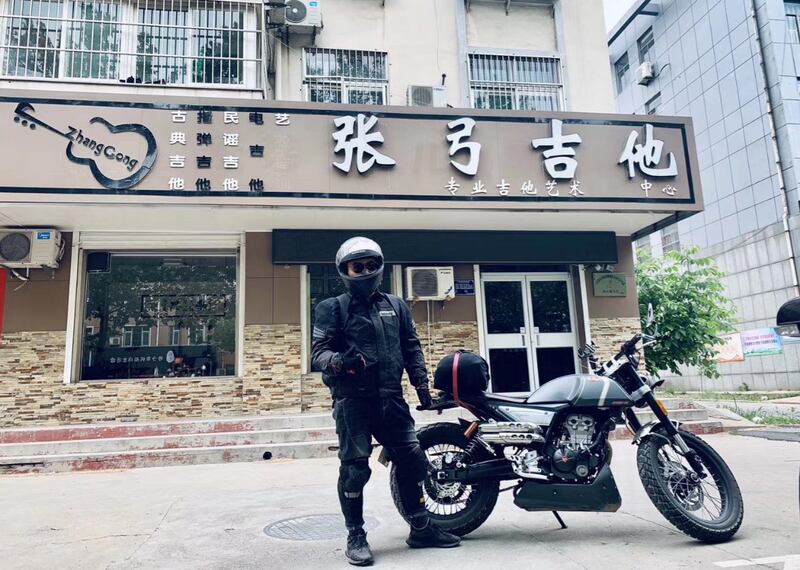Chinese police have been calling a U.S.-based singer-songwriter known as "Crazy Zhang" and demanding that he delete his music from Twitter, saying his satirical lyrics taking aim at ruling Communist Party leader Xi Jinping are "having a negative impact."
In another example of China's attempts at " long-arm" law enforcement beyond its borders, officials have been calling him from the Cyberspace Administration, the regular police and the state security police.
"Hey everyone, it's Crazy Zhang here – it's been mad the amount of people who have been calling me on the phone in the past few days," Zhang Gong said in a video statement via his Twitter account.
"They have been demanding that I delete all of my music from Twitter, and to delete my Twitter account," Zhang said. "When I asked them why, they said my music is having a negative impact."
"When I asked them on whom, they said they didn't know, but that there was a directive that came down from the central government calling on them to contact me immediately and to demand that I delete everything."
Police warned him that they would begin criminal proceedings if he failed to comply.
But Zhang told Radio Free Asia that he will continue to publish his music on social media despite the threats from officials back home.
Meanwhile, Zhang's wife – who is still in China – has had all of her social media accounts shut down.
"My wife called me last night and said that all of her social media accounts were shut down within a second of each other – WeChat, Xiaohongshu, Bilibili, everything," Zhang said.
"She doesn't even have a phone number any more."
‘Wrapped in foam and ice’
The calls started after Zhang posted a video of himself performing a song he wrote during the 2022 Shanghai lockdown, when millions of people were barricaded into their homes and neighborhoods as part of Xi Jinping's zero-COVID policy, subjected to daily compulsory testing, and hauled off en masse to out-of-town quarantine camps in the middle of the night.
"In a city of 1.4 billion people, the voices of despair rise and fall," the song, titled "Seven Storey Pagoda" in a reference to the preciousness of human life, goes.
"I see children, bodies wrapped in foam and ice," Zhang sings.

"I hear cries of help from people trying not to die in a fire," he sings, in an apparent reference to the fatal lockdown fire in Xinjiang's regional capital Urumqi that sparked mass " white paper" protests across China that eventually brought an end to the restrictions of the zero-COVID policy.
"How many human lives are trapped behind ... the iron sheets they just welded into place this afternoon?"
The song also takes aim at official propaganda around Xi's experience of hardship as a younger man.
"He shouldered 200 pounds of wheat for 10 miles through the mountains, yet he wants to lead 1.4 billion to their deaths," Zhang sings.
"If we don't fight, then death is inevitable," the song goes.
‘Locked down’
Zhang also took aim via Twitter at the crackdown on the "white paper" movement, commenting:
“In the 1960's, a villager accidentally dropped a picture of [China’s leader] on the ground and was beaten to death for it ...... In 2022, a brave young woman held up a blank piece of paper, and her whereabouts are unknown to this day!”
In an earlier protest song, Zhang sings in his trademark husky voice about how everything has been locked down.
"They've locked down the hills, locked down the rivers, locked down the sky and sun," the song, titled "Surrounded" goes.
"Locked down the sheep and cattle, the harvests and grain silos, the cities and the countryside," he sings.
Zhang, 30, told Radio Free Asia that his lyrics only criticized the government indirectly.
"I wrote these lyrics about what's currently going on in China, and maybe I touched on some of [the government's] sore points, but I didn't go all out and name anybody," he said. "People can figure that out for themselves."
Zhang hails from the central province of Henan, then grew up in the eastern province of Shandong, where he majored in classical guitar.
He recently joined the " run movement," an ongoing exodus of Chinese nationals fed up with the excesses of the zero-COVID policy and the economic stagnation that followed in its wake.
"There were so many tragic things happening around me every day, and so much injustice happening to people," Zhang said. "I'm a pretty emotional person, and I kept thinking that this could happen to me at any time, anywhere, and to my family."
"Things have been totally hopeless [in China] in the past few years," he said.
Zhang has now arrived in the United States, where he has applied for political asylum.
Translated by Luisetta Mudie. Edited by Malcolm Foster
